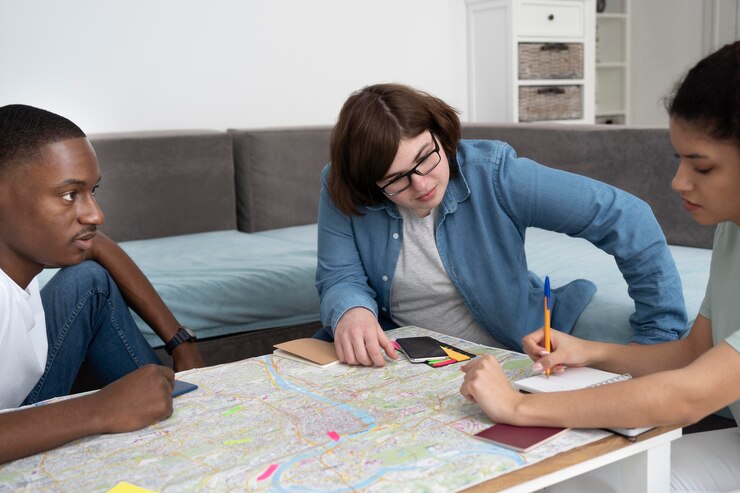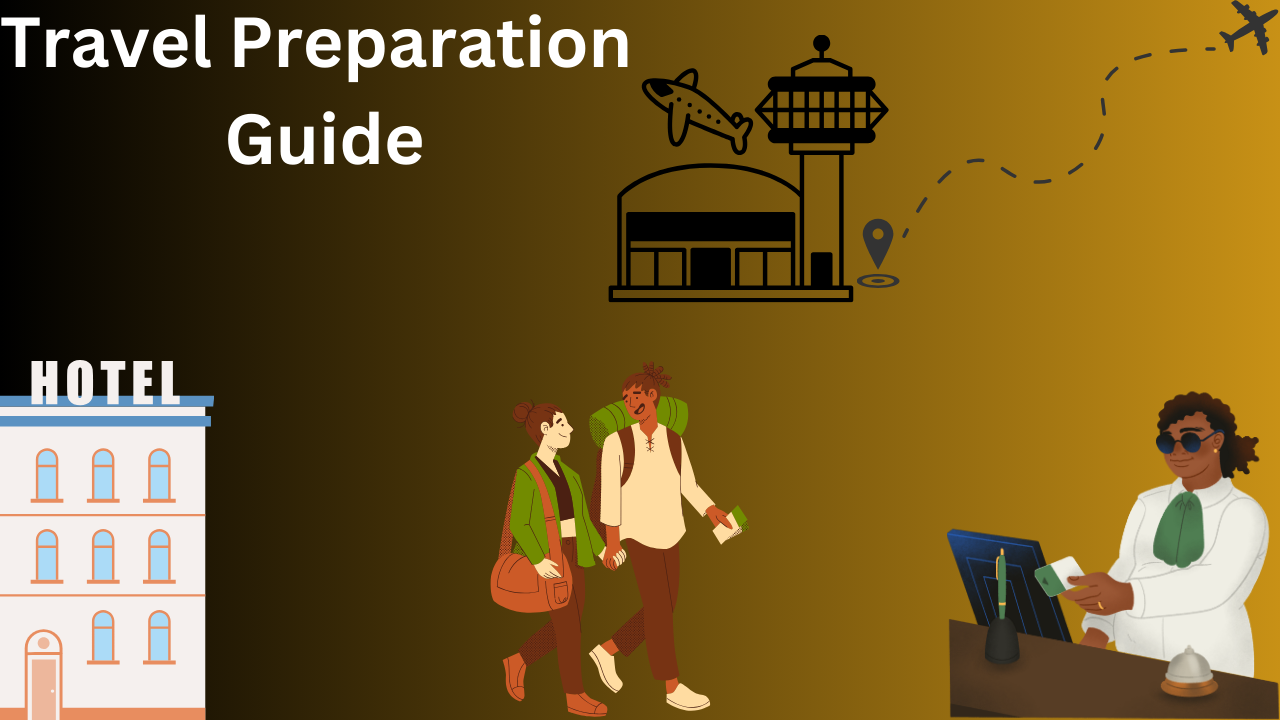Introduction
Are you ready to embark on a journey filled with unforgettable adventures in 2023? Traveling can be one of life’s most enriching experiences, but it requires meticulous planning and preparation. To make sure you’re prepared for your upcoming travels, we’ll walk you through each step in this extensive blog post. From researching your destination to immersing yourself in local culture, we’ve got you covered. Let’s dive in and make your travel dreams a reality!
Travel Preparation Guide
Pre-Travel Planning

Image by Freepik
Researching Your Destination
Before you even think about packing, it’s essential to get to know your destination. Research the local culture, language, and customs. Websites, travel forums, and guidebooks are your best friends in this phase. Dive deep to understand the essence of the place you’re about to visit.
Passport and Visa Requirements
One of the first things you should check is your passport’s expiration date. Ensure it’s valid for at least six months beyond your planned return date. Additionally, investigate visa requirements for your destination and initiate the application process well in advance. This step is non-negotiable to avoid any last-minute hassles.
Health and Vaccinations
Your health is paramount, and a healthy traveler is a happy traveler. Consult with a healthcare professional or visit a travel clinic to learn about recommended vaccinations and health precautions for your destination. Carry necessary medications and prescriptions, and don’t forget to pack a basic first-aid kit.
Insider Insight: During a backpacking adventure in North Eastern Kenya, I quickly realized the importance of vaccinations. A simple shot before leaving home protected me against diseases like hepatitis and typhoid, which are prevalent in the region. It’s a small cost that ensures you return home healthy and with incredible memories.
Pros:
- Preventive Measures: Vaccinations and medications provide a safety net against health risks at your destination.
- Peace of mind: Understanding safety tips and local customs empowers you to navigate unfamiliar places confidently.
Cons:
- Financial and Health Costs: Vaccinations and medications can be costly and might entail side effects.
- Information Overload: Drowning in safety information can be overwhelming; focus on the essentials.
Packing Essentials
Make a Packing List Creating a comprehensive packing list is a game-changer. It ensures you don’t forget any essential items. Include clothing suitable for the local climate, toiletries, travel documents, electronics, and any specialized gear for the activities you plan to undertake.
Packing Smart and Efficient
Packing is key to a stress-free journey. Consider using packing cubes or organizers to maximize space in your luggage. Rolling your clothes, rather than folding them, can prevent wrinkles and save valuable space.
Travel-Friendly Apps
The digital age has brought us a treasure trove of travel apps that can enhance your experience. Download apps like translation tools, currency converters, and maps with offline capabilities. These apps can be your lifeline while you’re on the road.
Pros:
- Efficiency: Crafting a packing list ensures you’re always one step ahead, avoiding last-minute panics.
- Versatility: Selecting versatile clothing means you’re prepared for any occasion without overloading your luggage.
- Space-saving: The simple act of rolling clothes saves space and minimizes wrinkles.
Cons:
- Over-packing Temptation: Having a checklist might make you want to pack everything, so exercise restraint.
- Fashion Limitations: Relying on versatile clothing might cramp your style if you’re a fashionista at heart.
Travel Documents:
Digital and Physical Copies
In this age of technology, it’s wise to make digital copies of all essential travel documents. These should include passports, visas, tickets, and reservations. Store them securely in cloud storage or on a USB drive. In addition to digital copies, carry physical copies in a separate bag. Being extra cautious here is a smart move.
Travel Insurance
While no one likes to think about worst-case scenarios, travel insurance provides peace of mind in case of unforeseen events like trip cancellations, medical emergencies, or lost luggage. A simple investment like this can spare you major headaches.
Personal Tip: During a trip to Ethiopia, I learned the importance of having copies of travel documents the hard way. My wallet was stolen in Addis Ababa, and having copies of my passport and other documents made the process of reporting the theft and obtaining a new passport much smoother. It’s a small effort that can save you a lot of trouble.
Pros:
- Preparedness: Checking your passport’s expiry and visa requirements in advance provides ample time for renewal or application.
- Security Blanket: Keeping copies of travel documents stored separately safeguards you in case of loss or theft.
- Peace of Mind: Comprehensive travel insurance guarantees peace of mind in the face of unexpected events like trip cancellations, medical emergencies, or lost luggage.
Cons:
- Cost Factor: Travel insurance can be an added expense to your travel budget.
- Paperwork Hustle: Keeping copies of travel documents means some paperwork and careful handling.
Also read: Adventure Travel Photography Gear Guide: 15 Essential Equipment for Stunning Shots
Ensuring your travel documentation and insurance are in order is paramount. Start by checking your passport’s expiration date and making sure you have all the required visas well in advance. Creating copies of these documents and storing them separately from the originals acts as a safety net in case of loss or theft.
Itinerary Planning
Immerse yourself in research about your travel destination and construct a well-rounded itinerary. This involves exploring must-visit attractions, dining options, and cultural experiences. Utilize online resources, travel guides, and recommendations to craft a comprehensive itinerary.
However, maintain a sense of balance. Leave room for spontaneity and unexpected discoveries. An excessively detailed itinerary could hamper your ability to explore freely and relish the serendipity of travel. Find a balance that suits your travel style.
Pros:
- Time Optimization: Planning your itinerary ensures you make the most of your travel days.
- Unforgettable Experiences: Researching and planning guarantees you won’t miss out on must-see attractions and activities.
Cons:
- Lack of spontaneity: An overly detailed itinerary might hinder your ability to explore spontaneously.
- Stress Triggers: Over-planning can result in a stressful trip; balance is the key.
Money Matters
Notify Your Bank
Your financial preparations are just as important as any other aspect of your trip. To prevent any problems with your credit or debit cards, let your bank know about your trip intentions. Inquire about foreign transaction fees and exchange rates for currency conversion.
Local Currency Exchanging
a small amount of local currency before you depart can be a lifesaver. It covers initial expenses and saves you from the hassle of searching for an exchange booth as soon as you arrive. Use ATMs at your destination for better exchange rates once you’re settled.
Safety and Security
Share Your Itinerary Safety should always be a top priority. Give a family member or acquaintance you can trust a copy of your vacation plans. This makes sure that in an emergency, someone will be aware of your location. It’s a simple yet effective precaution.
Secure Your Belongings
Invest in TSA-approved locks for your luggage, and consider using anti-theft bags for extra security. Keep your valuables, such as passports and electronics, in a hotel safe when not in use. These precautions can provide peace of mind during your journey.
On-the-Ground Preparation
Learn Basic Phrases
Learning a few basic phrases in the local language can be a game-changer. It shows respect for the local culture and can help you make connections with the people you meet. Use language apps and phrasebooks to get started, and be prepared to be amazed at the positive reactions you’ll receive.
Explore Local Cuisine
Food is a window to a culture’s heart. Don’t be hesitant to sample regional cuisine and fast food. Exploring the local culinary scene can be a highlight of your trip, introducing you to flavors and experiences you won’t find anywhere else.
Be Open-Minded
Embrace new experiences with an open mind. Travel often provides unexpected moments that can be the most memorable. Take it all in, and you’ll return home with a heart full of beautiful memories.
1. How far in advance should I start planning my trip in 2023?
- We recommend starting your planning at least 3-6 months before your intended travel date. This gives you ample time to research, secure visas, and find the best deals on flights and accommodations.
2. Should I buy travel insurance for every trip?
- While it’s not mandatory, it’s strongly recommended. Travel insurance provides valuable coverage in case of unexpected events, including trip cancellations, medical emergencies, and lost luggage. It’s a tiny cost to pay for security.
3. What vaccinations do I need for international travel?
- Vaccination requirements vary by destination. Consult a healthcare professional or visit a travel clinic to get up-to-date information on required and recommended vaccines for your specific location.
4. How do I exchange currency while traveling?
- You can exchange currency at your destination or your home country before departure. However, it’s often more cost-effective to use ATMs at your destination for currency exchange. Just make sure to notify your bank about your travel plans to avoid card issues.
5. Are travel apps really necessary?
- Travel apps can greatly enhance your trip. They offer translation tools, currency converters, maps, and real-time flight updates. They can save you time and help you navigate unfamiliar destinations more smoothly.
6. What should I do if I lose my passport or other essential documents?
- Immediately get in touch with the closest embassy or consulate of your native nation. They can provide guidance on replacing lost or stolen documents. It’s also wise to have digital copies stored securely in advance.
7. Is it essential to learn the local language when traveling?
- Learning a few basic phrases in the local language can greatly enrich your travel experience. It demonstrates respect for the culture and can help you navigate more effectively. However, English is widely spoken in many tourist destinations.
8. How can I keep my belongings safe while traveling?
- Invest in TSA-approved locks for your luggage and consider using anti-theft bags. Use hotel safes for valuables, and be vigilant in crowded areas. Keeping a watchful eye on your possessions goes a long way in preventing theft.
9. What are some tips for packing efficiently?
- Create a detailed packing list, pack clothes suitable for the local climate, and use packing cubes to save space. Roll your clothes to prevent wrinkles. Give products that can be combined and matched a high priority.
10. Should I try local food when I travel, even if it’s street food?
- Absolutely! Exploring local cuisine, including street food, can be a highlight of your trip. It allows you to savor authentic flavors and immerse yourself in the local culture. Just ensure that the food is prepared in a clean and hygienic environment.
11. What are the benefits of sharing my travel itinerary with someone back home?
- Sharing your itinerary with a trusted friend or family member is a safety precaution. In cases of emergencies or unforeseen events, someone will know your whereabouts and can assist you or contact authorities if needed.
12. What’s the best way to prepare for a successful and enjoyable journey?
- Preparation is key. Research your destination, pack wisely, secure your travel documents, and prioritize safety and cultural immersion. By following these steps, you’ll set the stage for an unforgettable adventure.
Conclusion
By following this comprehensive travel preparation guide for 2023, you’re setting the stage for a journey filled with unforgettable adventures. Remember, preparation is the key to a successful and enjoyable trip. Research your destination, pack wisely, secure your travel documents, and prioritize safety and cultural immersion. With these preparations, you’ll be ready to explore the world, creating memories that will last a lifetime. Bon voyage!





